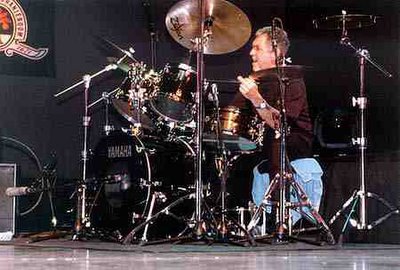____________________

I've mentioned before that my musical background and early focus was on being a drummer. It was my main activity through high school and into college, and I intended for a decade to do it for my life's work. I did, in point of fact, play with a couple small combos for my daily bread over a couple of summers while I was in college, though shortly afterward I moved on to other things. Still, it is the instrument which (along with the pipe organ and the piano) I know the best, and my attention moves first to the drummer in any musical situation before I move onto other, higher brain things.
Lately I've been watching a DVD of Eric Clapton playing in Los Angeles in 2001. I'm not particularly a Clapton fan, though I'll allow that he is always in the company of first-rate musicians. Certainly, I admire his modesty and the absence of affectation in his playing and manner. For this concert, the guitar god is backed up with an all-star supporting cast: Dave Sancious, Nathan East, Andy Fairweather Low (love that name; I wonder if it's real?), the ebullient Billy Preston, and the real star of the show for me, Mr. Steve Gadd.

If one has paid any kind of attention over the past 30 years to drumming-related things, the name Steve Gadd has been seen in all the nicer places. Wikipedia says he is probably the most recorded drummer in history, but that only means he is successful, not necessarily that he's more than a journeyman.
But he is. He's really extraordinary, and in a self-effacing way that I so admire. He is adept over a greater range of styles than any single person has a right to be, and he seems to make short work of even the most challenging material. People of... a certain age will know his work with Paul Simon (the fabulous latin drum break in "Late in the Evening" and the memorable beat in "50 Ways to Leave Your Lover" to name a couple) and Steely Dan (the fantastic drum work on "Aja" and "Gaucho") along with Clapton and Rickie Lee Jones and many others.
 As a drummer I cannot but be mesmerized by his playing, and I'm convinced I would be wearing out the DVD whether or not I knew of him in advance. And it's not simply his unquestionable technical mastery, however gratifying that is to one who toils at the same instrument. He looks for all the world on this DVD like the guy who shows up to unclog your toilet. Tattooed and gray-haired and paunchy, his 56 years look not to have been easy ones. There is not the slightest effort made to Disney-fy what he does: he does not smile, he rarely swoons to the others' playing, the effort of some things makes him grimace menacingly. He is dressed like he's headed to the driveway to change the oil in his car.
As a drummer I cannot but be mesmerized by his playing, and I'm convinced I would be wearing out the DVD whether or not I knew of him in advance. And it's not simply his unquestionable technical mastery, however gratifying that is to one who toils at the same instrument. He looks for all the world on this DVD like the guy who shows up to unclog your toilet. Tattooed and gray-haired and paunchy, his 56 years look not to have been easy ones. There is not the slightest effort made to Disney-fy what he does: he does not smile, he rarely swoons to the others' playing, the effort of some things makes him grimace menacingly. He is dressed like he's headed to the driveway to change the oil in his car.But that stuff's all bullshit. He is not an entertainer. He is an artist. A true musician. One who just happens to play an instrument to which, the Muppets remind us, a practitioner traditionally may need to be chained. The old joke has a guy describing his band as "three musicians and a drummer." But Steve Gadd reminds me that the most gifted musical minds are not confined to the limits of their instrument; on the contrary, the best musicians expand on each other to produce something larger than the sum of the parts. Synergy, man.
I've never seen a musician in any genre who is less concerned to draw attention to himself than Steve Gadd, in spite of his playing an instrument which is intrinsically ostentatious. In life as in music, this seems an admirable quality. He is here playing material which avails itself of about 30% of his technical prowess, yet he never gives less than 100% of himself to the task. Avert your eyes and listen to the sound and he is perfectly, miraculously, unfailingly correct and appropriate. And something more. His chosen instrument, by tradition, plays a supporting role. And though he is certainly the equal at his instrument of anyone on the stage at theirs, yet he both keeps without complaint to his supporting role and manages to rise above it and do something lasting and inspired. In this he reminds me of the always-unsung piano accompanist: there is often astounding musicianship there in a supporting role to the featured soloist. (Frank Sinatra's longtime accompanist, Bill Miller, comes to mind here.)
Three cheers for The Man!
No comments:
Post a Comment